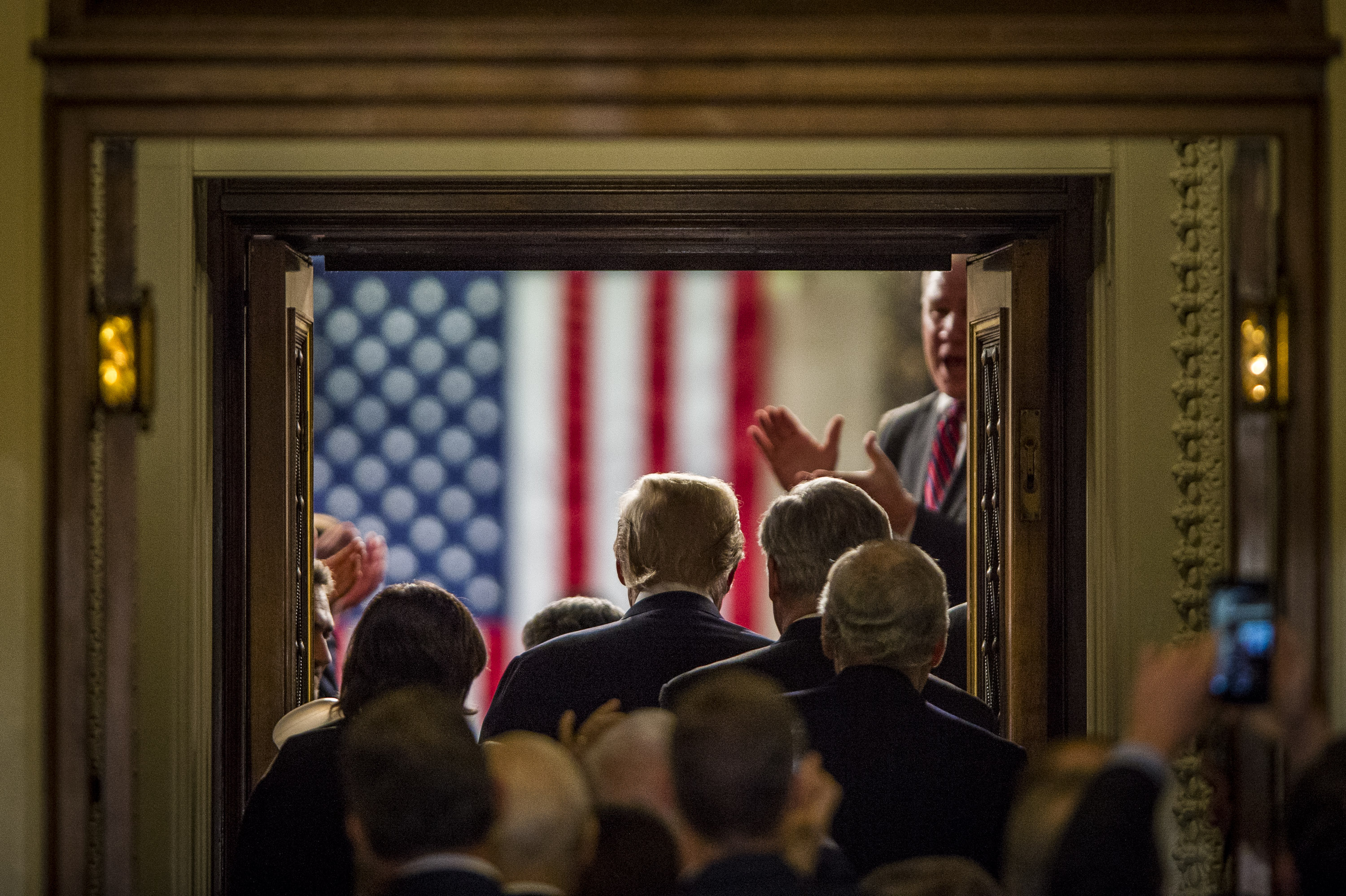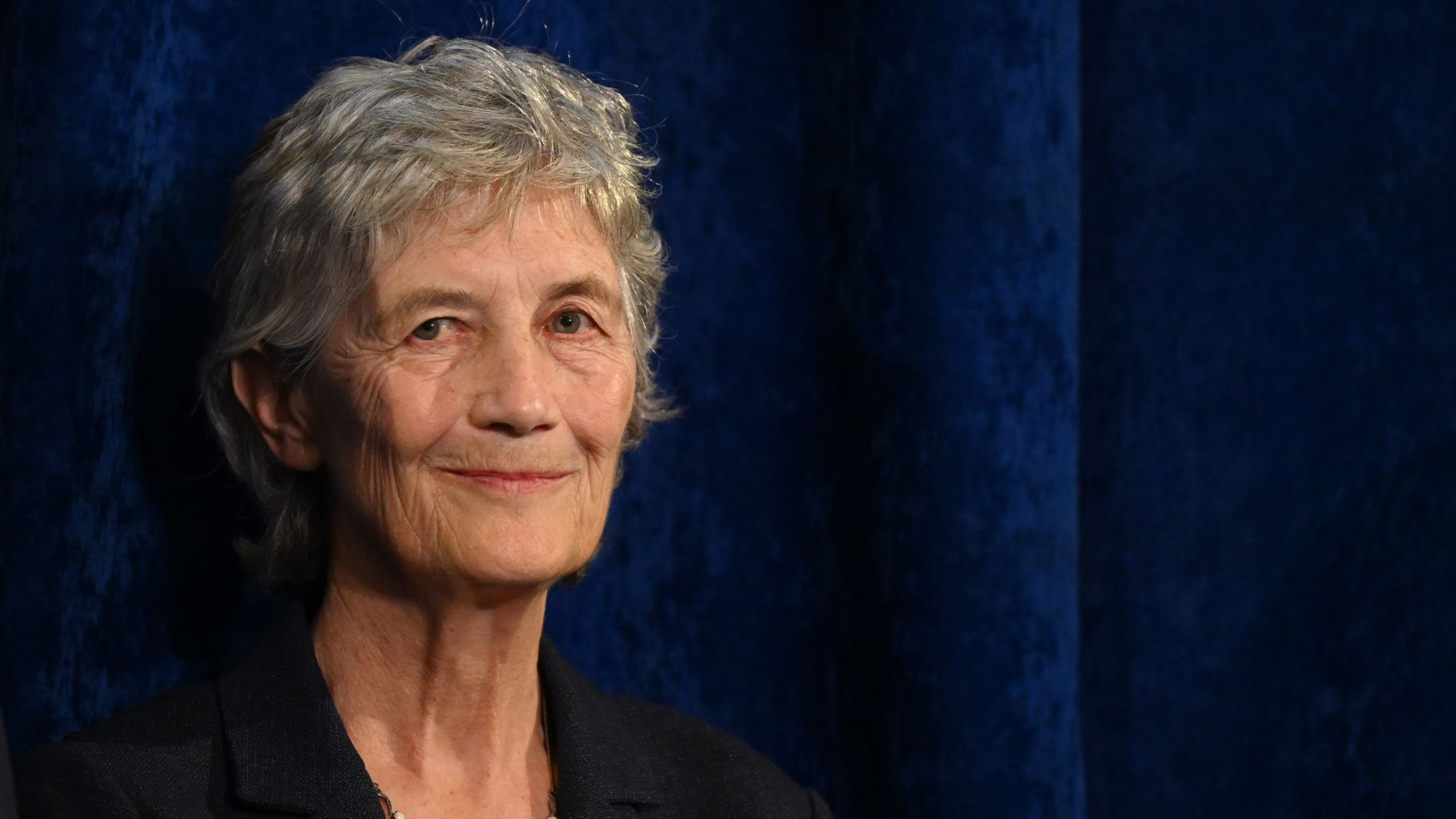How Trump squandered his State of the Union address
The president had an opportunity to turn over a new leaf. He wasted it.


When President Trump stepped up to the podium for his first State of the Union address, he did so as the least popular president at this point in his term since the invention of scientific public opinion polling. The president's congressional allies spent the last few days laying down covering fire for his attempts to smear and bury the Russia investigation, even as it becomes more obvious every day that a gigantic political fireball is about to engulf this administration. Did the president do anything to change that toxic narrative, redirect public attention to his priorities, and rebuild public trust?
No, absolutely not.
During his speech, the president met the hilariously low expectations set for him: He successfully read his address using his inside voice. He appeared to be in at least modest control of his dwindling faculties. He wasn't snarfing a cheeseburger on national television. His speechwriters moved him away from the kind of childish, bombastic rhetoric he frequently employs on Twitter. He mustered some lofty, inoffensive rhetoric, telling the country that "Americans fill the world with art and music. They push the bounds of science and discovery."
The Week
Escape your echo chamber. Get the facts behind the news, plus analysis from multiple perspectives.

Sign up for The Week's Free Newsletters
From our morning news briefing to a weekly Good News Newsletter, get the best of The Week delivered directly to your inbox.
From our morning news briefing to a weekly Good News Newsletter, get the best of The Week delivered directly to your inbox.
The most that can be said about this speech is that it did not further torch the boundaries of decency and good taste. He didn't call the Senate minority leader "Cryin' Chuck Schumer" or run down NFL players as traitors or call for very specific cable TV hosts to be fired for transgressions against #MAGA. But if you listened carefully, after he was finished reciting the stories of manufacturing growth and natural disaster heroism in Houston and California, he returned, zombie-like, to his deepest cultural resentments: immigrants, foreigners, forbearance, and the very possibility of human kindness. The man feasts on nothing else. These things are his essence, his every meal. And last night he made it clear that he intends to stake his presidency on them.
President Trump was expected to place heavy emphasis on the economic policies he believes delivered a year of robust economic growth for the American economy. Voters might credit former President Obama for this, but Trump touted job growth and unconvincingly pointed to record-low unemployment for African Americans and Latinos as evidence of his own success. He brought tame platitudes, like, "If you work hard, if you believe in yourself, if you believe in America, then you can dream anything, you can be anything, and together, we can achieve absolutely anything." But the president himself could not achieve the simple rhetorical task of using cause-and-effect to tie his policies to economic prosperity.
He spent just a few minutes on jobs before turning to his true-north obsessions: the various plots against America hatched by North Koreans, Salvadoran gangs, Iranians, Mexicans, and above all else, those filthy "chain migrators." Absurdly, he suggested that a crackdown would be something that "protects the nuclear family," by preventing aunts, uncles, cousins, and grandparents from joining their loved ones in America. He railed against MS-13 and called for a massive reduction in legal immigration. He doubled down on America's extrajudicial nightmare in Guantanamo and promised a nuclear arms race. "Perhaps some day in the future there will be a magical moment when the countries of the world will get together to eliminate their nuclear weapons," he said, with no intention whatsoever of facilitating such an outcome. While he avoided the rumored broadside against the Russia investigation, the speech ultimately felt small and fearful, full of human props for whom the president has no real empathy, and bromides that obscured the shocking lack of policy vision or details. Like his inaugural address, its central premise was fear and its primary emotional register was loathing.
But it won't work. Trump's unpopularity actually affects how likely it is that Congress will take up the few policy proposals he emphasized last night. Research about the effects of the State of the Union is thin, but a 2015 article in The Policy Studies Journal found that popular presidents with control of one or more branches of Congress can exert a short-term influence over the direction of public policy. The effect disappears when the president is as radioactive as Trump is today. As the authors note, "an unpopular president will simply be ignored." And because Trump was unable to articulate clear policy goals or even name a single bill currently before Congress, he is almost certainly incapable of using his office to promote preferred policies or force a fractious Congress to act on his priorities.
A free daily email with the biggest news stories of the day – and the best features from TheWeek.com
Those policies he did announce or defend were mostly right-wing wish-fulfillment fantasies, like punishing countries that voted against moving the U.S. embassy in Israel to Jerusalem. He tasked Congress with the nonsense job of trying to "ensure American foreign assistance dollars always serve American interests and only go to friends of America, not enemies of America," and argued that for the fight against opioids, "the struggle will be long and it will be difficult." He didn't mention any details or whether the battle would be well-financed or well-staffed or whether he might attach someone other than a 24-year-old campaign aide to it. He couldn't explain how he'll get his cruel immigration parameters through a fractious GOP caucus, let alone Congress as a whole.
That lack of vision is a shame, because the State of the Union is, in addition to being a venue for the president's policy agenda, also a place where bigger-picture ideas are unveiled to the public. In his final State of the Union address, President Obama set the lofty goal of making the United States the first country to eradicate cancer. These initiatives are, by their design, not something that be can be achieved in a single administration, but rather a call to reorient some major piece of federal policymaking toward a shared national dream. President Trump shared no such long-term visions for the future of his country, instead zeroing in on his dark hobbyhorses.
Last night was thus a rare and missed opportunity for the president to direct attention away from his temperament and divisiveness toward the issues he would like to be judged on, including the economy, progress in the fight against ISIS, and defense spending. To have any chance at saving his party's congressional majorities or winning re-election, the president must convince the American people to ignore their well-justified conclusion that the president is an impudent jerk and to judge him solely on GDP growth numbers. That goal was ill-served by the president's narrow, defensive State of the Union address.
David Faris is a professor of political science at Roosevelt University and the author of "It's Time to Fight Dirty: How Democrats Can Build a Lasting Majority in American Politics." He's a frequent contributor to Newsweek and Slate, and his work has appeared in The Washington Post, The New Republic and The Nation, among others.
-
 Salted caramel and chocolate tart recipe
Salted caramel and chocolate tart recipeThe Week Recommends Delicious dessert can be made with any biscuits you fancy
-
 Meet Ireland’s new socialist president
Meet Ireland’s new socialist presidentIn the Spotlight Landslide victory of former barrister and ‘outsider’ Catherine Connolly could ‘mark a turning point’ in anti-establishment politics
-
 Should TV adverts reflect the nation?
Should TV adverts reflect the nation?Talking Point Reform MP Sarah Pochin’s controversial comments on black and Asian actors in adverts expose a real divide on race and representation
-
 Millions turn out for anti-Trump ‘No Kings’ rallies
Millions turn out for anti-Trump ‘No Kings’ ralliesSpeed Read An estimated 7 million people participated, 2 million more than at the first ‘No Kings’ protest in June
-
 Ghislaine Maxwell: angling for a Trump pardon
Ghislaine Maxwell: angling for a Trump pardonTalking Point Convicted sex trafficker's testimony could shed new light on president's links to Jeffrey Epstein
-
 The last words and final moments of 40 presidents
The last words and final moments of 40 presidentsThe Explainer Some are eloquent quotes worthy of the holders of the highest office in the nation, and others... aren't
-
 The JFK files: the truth at last?
The JFK files: the truth at last?In The Spotlight More than 64,000 previously classified documents relating the 1963 assassination of John F. Kennedy have been released by the Trump administration
-
 'Seriously, not literally': how should the world take Donald Trump?
'Seriously, not literally': how should the world take Donald Trump?Today's big question White House rhetoric and reality look likely to become increasingly blurred
-
 Will Trump's 'madman' strategy pay off?
Will Trump's 'madman' strategy pay off?Today's Big Question Incoming US president likes to seem unpredictable but, this time round, world leaders could be wise to his playbook
-
 Democrats vs. Republicans: who are US billionaires backing?
Democrats vs. Republicans: who are US billionaires backing?The Explainer Younger tech titans join 'boys' club throwing money and support' behind President Trump, while older plutocrats quietly rebuke new administration
-
 US election: where things stand with one week to go
US election: where things stand with one week to goThe Explainer Harris' lead in the polls has been narrowing in Trump's favour, but her campaign remains 'cautiously optimistic'
